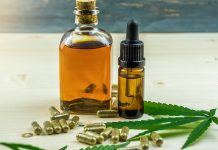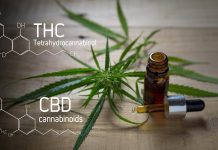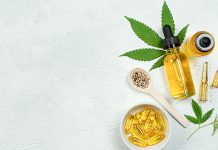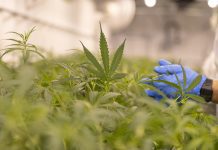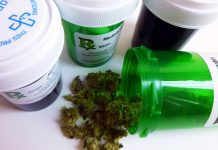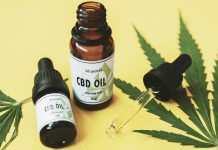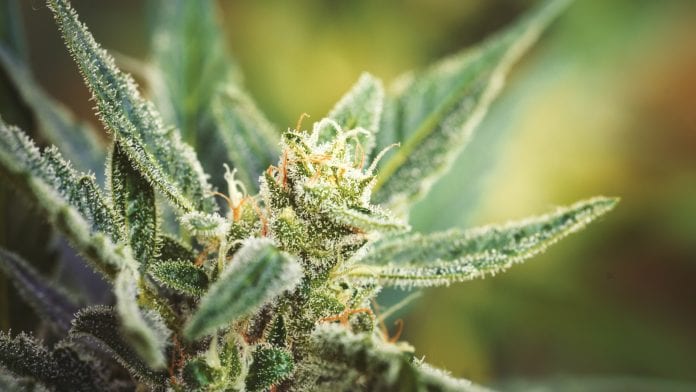
If you’ve been visiting health stores or websites recently, you’ve probably seen advertisements for cannabidiol (CBD) at some stage, but what is cannabidiol?
There is no shortage of claims made by some companies, particularly in the dietary supplement industry – but getting a prescription from a doctor for a CBD medicinal preparation, rather than a food supplement can require the patience and tenacity that most mere mortals don’t have. This article will take a brief look at what is cannabidiol, why it’s so popular, its potential, and why it isn’t as easy to obtain as many think it should be.
CBD: the basics
The cannabis plant contains over 560 active compounds, with over 100 of these belonging to a group known as cannabinoids. The most well-known cannabinoids are CBD and delta 9 Tetrahydrocannabinol (THC).
Cannabidiol is a non-psychoactive anxiolytic (it reduces anxiety) that is believed to mediate effects of THC (which does have psychoactive properties). While most of the medicinal cannabis used around the world contains cannabinoid ratios where CBD is dominant, there are many conditions for which a microdose of THC adds efficacy. The growing clinical interest in CBD preparations is due to its non-psychoactive and anti-inflammatory properties, accompanied by a range of other potential uses. CBD has been used and prescribed for conditions such as Epilepsy, Inflammatory Bowel Disease (IBD), Multiple Sclerosis, Cerebral Palsy, Parkinson’s disease, Anxiety, Post Traumatic Stress Disorder (PTSD) and Bipolar Disorder.
Although there is a growing evidence base, the reasons for the success of CBD are not completely understood. However, a commonly accepted theory is that cannabidiol seems to act indirectly on the endocannabinoid receptors CB1 and CB2 by preventing the breakdown of a chemical in the brain that affects the experience of pain, mood and mental function.
The growing CBD market
The CBD market is driven by the versatility of CBD itself. It can be used as a medicine, as a supplement and even as a beauty product. In fact, some financial analysts have said that the CBD beauty product industry should be considered a separate category from both medicinal and recreational cannabis; with predictions that the CBD beauty industry alone could be as large as USD $50 bn to $100 bn (~€44 bn to €88 bn). However, it should be noted that beauty products are made from hemp CBD. More on hemp CBD later.
CBD derived from medicinal cannabis is increasing in demand globally. The global CBD market is estimated to reach $22bn by 2022. It was around $1.5 billion in 2018. This rapid increase is attributable to the growing acceptance worldwide by both patients and governments that CBD does have health benefits.
Why is CBD easier to access than THC and other cannabinoids?
CBD contains no psychoactive properties and is considered safe to use as a medicine with no significant side effects. In fact, the World Health Organization (WHO) has gone as far to say that to date “there is no evidence of recreational use of CBD or any public health related problems associated with the use of pure CBD.”
THC, on the other hand, may be associated with psychoactive affects at higher doses, which many jurisdictions link only to recreational use. One of the main reasons many jurisdictions have fought the legalisation of CBD, is out of concern that the product may contain some THC.
Companies wanting to produce CBD related medicines or supplements must undergo the same regulatory restrictions that are applied to products containing THC, due to the ongoing influence of a multi-lateral treaty signed in 1961, known as the Single Convention on Narcotic Drugs, 1961 (the Single Convention).
The aim of the Single Convention is to “combat drug abuse by co-ordinated international action.” It does this by seeking agreement from signatories to the treaty to not allow the use, possession, distribution, manufacture etc., of scheduled drugs within their jurisdiction unless for medical or research purposes, and under strict guidelines. It also seeks international cooperation to stop drug trafficking.
Under the Single Convention, Schedule I drugs include drugs such as cannabis, heroin, fentanyl and morphine. However, a more restrictive category (Schedule IV) lists certain Schedule I drugs that are considered to be highly addictive, likely to be abused and rarely used in medical practice. This category includes cannabis and heroin. It is this designation as a Schedule IV drug internationally that is restricting access to cannabis, even for medicinal purposes.
Another restriction within the Single Convention is that CBD is only exempted from these restrictions when it is derived from the cannabis seed or stalk and not the flowering heads. There is also no international legal structure (currently) for the transport or import/export of CBD from the flowering heads (FLOS) of hemp. Finally, some jurisdictions do not allow permission for CBD or cannabinoid marketing or claims under any circumstances, even under a hemp licence, unless the preparation is undergoing medicine registration like Epidiolex or Sativex. This includes the UK, Australia and the US.
CBD and the hemp misconception
Hemp-derived CBD is assumed by many to be able to be used for anything without the restrictions of medicinal cannabis. Hemp-derived CBD is the same molecule as the CBD in medicinal cannabis preparations but derived from the seed and not the flowering tops, and from cultivars with less than 0.3% THC. Despite this, there are still restrictions on what can be done with CBD from hemp.
The United States
The US has major contrasts and conflicts between state laws and federal laws. What should be noted is:
- At a national level, CBD extracted from THC containing cannabis is not approved as a prescription drug, dietary supplement, or allowed for interstate commerce in the United States. It is also not allowed in other consumer products or pet foods;
- Although CBD derived from hemp (with 0.3% THC or lower) was delisted as a federally scheduled substance by the 2018 Farm Bill, FDA regulations still apply; and
- Hemp CBD is legal to sell as a cosmetic ingredient, but despite a common misconception, because it is an active ingredient in an FDA-approved drug, cannot be sold under federal law as an ingredient in food, dietary supplements, or animal food. That approved drug is Epidiolex.
It is a common misconception that the legal ability to sell hemp (which may contain CBD) makes CBD legal. It does not. The only hemp products that can be sold are those that come from hemp “if and only if, that hemp is produced in a manner consistent with the ‘Farm Bill,’ associated federal regulations, association state regulations, and by a licensed grower.” The upshot is that CBD from hemp is not legal – federally.
The situation in the US is complicated by the inconsistent approach taken by individual states. The Farm Bill 2018 has no effect in states that have legalised medicinal cannabis and this is the source of much confusion, as the ability to harvest the flowering tops of hemp and process them to extract CBD falls within medicinal cannabis legislation.
The extraction of CBD from hemp seeds or stalk, is allowed in the US under a hemp licence. Many CBD product companies believe that once the CBD has been extracted from the flowering tops of hemp into an oil or crystal, this distinction disappears. It does not – as some major CBD manufacturers and producers have recently discovered. Until there is a national approach agreed to by all states, CBD derived from hemp will only be available within the state in which it was produced; as long as no health claims are made in marketing or packaging, the FDA is unlikely to get involved.
United Kingdom
In the UK, only a Medicines and Healthcare products Regulatory Agency (MHRA) licensed, approved medicine can make explicit health claims. With demand running high, the availability of rapid return on investment attracts some undesirable operators into the market. As in the US, CBD extracted from hemp seed or stalks is legal, while CBD extracted from the leaves or flowering tops is prohibited except under a Home Office authorised medicinal cannabis production licence.
According to the BBC, the MHRA has contacted 180 stockists since 2016 over concerns they were making unauthorised health claims for CBD. This is a worrying figure for those that have entered the market in good faith and have conducted all the necessary due diligence to ensure their products are of the highest standard (and actually contain the ingredients they list on their label). At present, manufacturers must get products licensed through the European Medicines Agency (EMA) before making explicit health claims. To date, only Epidiolex has begun (and almost completed) this process. Epidiolex has been prescribed to at least 80 people in the UK through the National Health Service (NHS) for people with Dravet and Lennox-Gastaut syndromes.
At present, the NHS does not recommend CBD for any other conditions. In addition, an announcement this month by the National Institute for Health and Care Excellence (NICE) indicated that it would not support medicinal cannabis prescription by NHS doctors until more evidence becomes available and directed the NHS to fast track clinical trials, making that a requirement for any company seeking an MHRA ‘specials marketing licence‘ or Home Office licence.
Australia
Following a change in legislation in 2017, CBD was changed from a schedule 9 drug to a schedule 4 drug – meaning that it is legally available in Australia. A schedule 4 drug is available as a prescription only medicine, or a prescription animal remedy, which can only be dispensed by a pharmacist. CBD cannot be produced under a hemp licence under any circumstances, and no claims about CBD, cannabinoids or health benefits can be made about hemp derived seed, which is the only partially legalised for human consumption in Australia and New Zealand.
Why is regulating CBD so important?
We want to get our CBD but the ‘good stuff’ only comes under strictly regulated conditions. Why can’t it be provided more easily? It’s all just CBD, after all.
Well, the problem is in any market where there is profit to be made, there will also be some unscrupulous profit-seekers. CBD is no different. What is concerning in the CBD market is the ability for other chemicals and compounds to accompany CBD in products – particularly THC.
Studies have shown that nearly 70% of all CBD products sold online were incorrectly labelled; some might contain THC, contaminants, or no CBD at all. In a market where some of these products are taken as medication prior to driving or operating machinery, the consequences could result in the failing of a drug test, loss of licence, loss of employment, or worse. Additionally, such variation within a product makes it difficult for those treating a condition to determine if it’s the dosage, or something else that is causing an improvement, or indeed other unwanted reactions to the medication.
Therefore, we need a consistent and strongly regulated industry that can build trust and improve standards – and therefore be safer in the long term.
Re-scheduling cannabis – the light at the end of the tunnel
There has been movement at the highest level recently that will eventually make CBD more easily available. In 2018 the WHO, through its Expert Committee on Drug Dependence (ECDD), recommended that cannabis be moved from Schedule IV to Schedule I, so that it is permitted for medical use under less stringent regulations. The WHO’s recommendations have yet to be voted on by the relevant United Nations committee, although acceptance of the recommendations will pave the way for accessible CBD in the future. This seems to be a sensible approach to a molecule with so much promise for good.
CBD markets in the future
The future of CBD is not just in medicine and dietary supplements. As mentioned above, CBD is making huge inroads into the cosmetic industry with products such as lipsticks, perfume, facial cream and moisturisers. CBD has also been used in bathing and hair care products. The pet healthcare industry is also starting to see the benefit of CBD which could lead to another major market.
Although it is still early, the beverage industry is looking at the benefits of CBD infused drinks. Indeed, the investment of some large beverage corporations into the medicinal cannabis sector show how serious this market could be. Current estimates are that the US CBD infused drinks market could be worth around $1.4bn by 2023. Before CBD becomes a ubiquitous part of our food chain it would be wise to ensure consistency in labelling to ensure the public safety and to understand the daily recommended dose of CBD, something which the scientific community has not yet established.
CBD presents amazing opportunities for both patients and producers. While improving access is important, it is imperative that we acknowledge the importance of weeding out undesirable operators to promote an industry which is trustworthy, capable and sustainable.
References
- Garcia, A. 2017. CBD beauty industry: How big is the potential market really? Born2Invest website. (https://born2invest.com/articles/cbd-beauty-industry-potential-market/)
- World Health Organization. 2017. Cannabidiol (CBD) Pre-Review Report. Expert Committee on Drug Dependence Thirty-ninth Meeting Geneva, 6-10 November 2017.
(https://www.who.int/medicines/access/controlled-substances/5.2_CBD.pdf) - United Nations Office on Drugs and Crime. 1961. Single Convention on Narcotics Drugs, 1961. (https://www.unodc.org/unodc/en/treaties/single-convention.html)
- United States Senate Committee on Agriculture, Nutrition, & Forestry. 2018 Farm Bill. https://www.agriculture.senate.gov/2018-farm-bill
- Hudak, J. 2018. The Brookings Institution website. The Farm Bill, hemp legalization and the status of CBD: An explainer. (https://www.brookings.edu/blog/fixgov/2018/12/14/the-farm-bill-hemp-and-cbd-explainer/)
- University of Pennsylvania. 2017. Penn Medicine website. Penn Study Shows Nearly 70 Percent of Cannabidiol Extracts Sold Online Are Mislabeled. (https://www.pennmedicine.org/news/news-releases/2017/november/penn-study-shows-nearly-70-percent-of-cannabidiol-extracts-sold-online-are-mislabeled)
- Government of Canada. Cannabidiol (CBD). https://www.canada.ca/en/health-canada/services/drugs-medication/cannabis/about/cannabidiol.html
- Long, J. 2019. Competing concerns in the CBD market – deep dive. 2019. Natural Products Insider. (https://www.naturalproductsinsider.com/herbs-botanicals/competing-concerns-cbd-market-deep-dive)
Elisabetta Faenza
CEO
Leafcann Group Pty Ltd
+61 414 447 275
ef@leafcann.com
https://www.leafcann.com.au/
This article will appear in Health Europa Quarterly Issue 11, which is available to read now.



